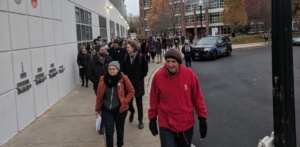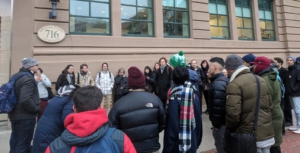
On Nov. 15, faculty, students, and union organizers marched down Columbus Avenue in Boston to deliver a letter to Northeastern University’s president Joseph Aoun. The letter signed by students, faculty, and union members urges Northeastern to allow full-time, non-tenure track professors to hold a union election. Holding an election to unionize is a labor right for most workers in this country, however, it’s a right that is currently being deviously sabotaged by the Northeastern administration.
On Nov. 5, many non-represented professors (who do not have many of the same job protections and perks as their tenured counterparts) took a petition to the Labor Relations Board, starting a process which would hopefully lead towards a union election. Northeastern retaliated by asserting that these professors were actually “managers,” and thus ineligible to conduct or vote in an election. This is clear union busting rhetoric in action since these professors are not paid like managers, nor treated like managers.
This legal language serves an even more insidious purpose however. In order to confront Northeastern’s false claims, organizers and faculty would have to take their demands to a federal hearing of the National Labor Relations Board. Currently, the NLRB is dominated by anti-union Trump appointees eagerly looking to crush any labor movements. For anti-union forces, this case has the added benefit of setting a nationwide precedent: all full-time non-tenure track professors would be considered managers, not just Northeastern faculty.
Due to the risk of defeat at the federal level at this time, the faculty decided to rethink their strategy and take a more grassroots approach. With the support of students, faculty, union organizers and the community, they presented a letter to Aoun’s office demanding the removal of the managerial status and the right to unionize.

Why is this struggle so threatening to the Northeastern administration? The main demands are for longer, more stable contracts, as well as collective bargaining rights. One of the Associate Teaching Professors marching with the group was involved in organizing a successful campaign at Boston University in 2013. “[BU had] a completely different atmosphere” she said, referring to the job after they won a union. “You have actual rights to have a voice. Rather than right now, where if you talk about the wrong thing, [or] if you’re not doing what the administration wants you to do, it can get rid of you without any kind of accountability.”
Typically, this complete control over workers can be employers’ strongest bargaining chips to keep wages low, benefits sparse, and organizing efforts minimal. She emphasized that “faculty don’t say anything because they are afraid. If they call a superior out on sexual harassment, they will be fired. This is a real case right now. These are things that with a union, we wouldn’t have to worry about … basic rights, and basic expectations of our employer.”
Northeastern has a long history of fighting against organized labor. They frequently hire the most notorious (and expensive) anti-union lawyers in the country. Last year they lost a lengthy struggle against dining hall workers, who are now organized under Unite Here Local 26. The administration still refuses to allow graduate students to unionize despite their well-organized campaigns and clear support among students. President Aoun’s salary is one of the highest in the country at $1,311,729 and improvements are channeled into flashy but unsubstantial tech renovations in order to move up in national university rankings. At Northeastern, the lack of administration support for the rights of faculty clearly shows that optics overshadows education.






